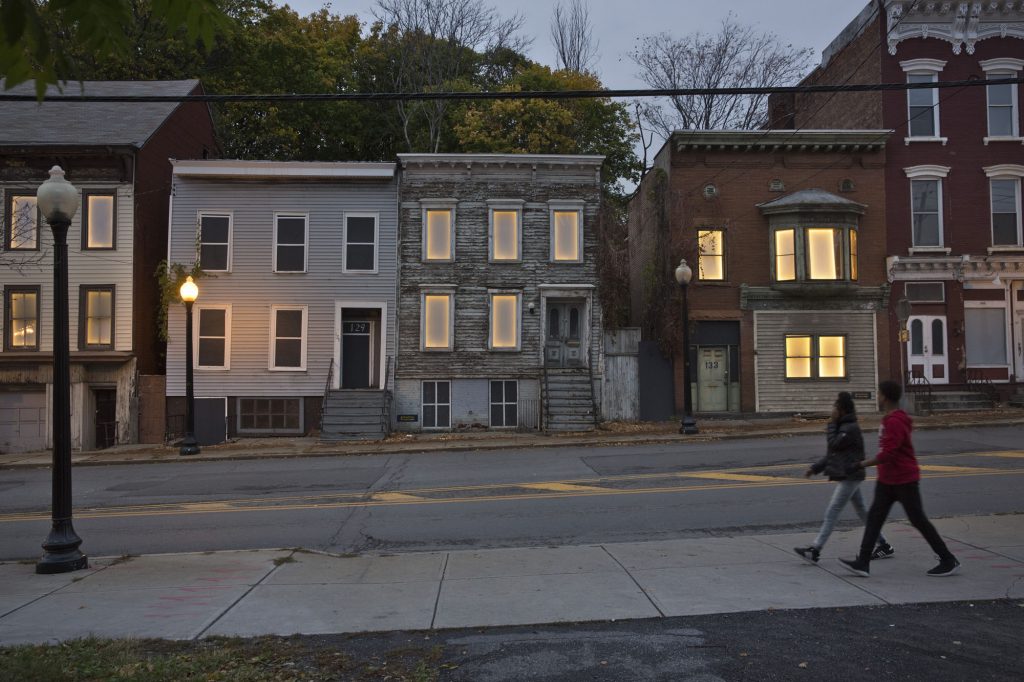Nine of the most inspiring ideas I’ve seen this year

By James Anderson, Bloomberg Philanthropies Government Innovation Team
Amidst numerous global crises and fractured national politics, many are looking with increased urgency to cities for hope and to drive human progress. That’s why, now more than ever, we need bold creativity from local leaders. Here are nine ideas – some funded by Bloomberg Philanthropies, many that aren’t – that show that our cities, and their leaders, are more than up to the task.
-
Breathing light into abandoned homes (Albany, Schenectady, and Troy, N.Y.):
In neighborhoods where blight has taken a heavy toll, it can be easy to forget that these boarded up properties once were homes filled with people and activity. Breathing Lights, a temporary exhibit that was part of the Bloomberg Philanthropies Public Art Challenge, made hundreds of these vacant buildings pulsate with life once again. Check it out.
-
Using gamification to tackle childhood obesity (Santiago, Chile):
In a country with one of the world’s highest rates of obesity, the capital city is taking exciting measures to fight the problem among children. Juntos Santiago, with the support of Bloomberg Philanthropies, will use competitions to get entire school communities to encourage better eating and exercise habits among kids, awarding them points that can be used to ‘purchase’ new playground and park equipment.
-
Re-blocking the streets (Barcelona, Spain):
Last September, Barcelona began transforming three-block by three-block sections of the city grid into areas designed to meet the needs of people. These superilles, or “superblocks,” limit the number of roads that cars can use to cross the city to the periphery and dramatically limit speeds for local traffic within. Pedestrian amenities and playgrounds will one day take over some of the spaces today occupied by cars.
-
Using data to empower employees (Denver, C.O.):
In 2011 Denver created its Peak Academy to show all city employees how they could improve their work through the use of data, an effort that helped Denver save $21 million in 2016. Now Peak Academy Director Brian Elms has published a new book that shows cities everywhere how they can do the same.
-
Fighting climate change with citizen engagement (Stockholm, Sweden):
With this spring’s opening of its first biochar plant, a winning idea from the 2014 Bloomberg Philanthropies Mayors Challenge, Stockholm is showing what it means to put citizens at the heart of sustainability efforts. When participating in traditional recycling, residents put items in a bin and assume the cans, papers, and bottles are properly processed from there. Now, people can get further involved by bringing plant refuse to the biochar plant, which is turned into garden-boosting and carbon-reducing biochar that they can take home and place in their gardens. This virtuous circle promotes deeper engagement and investment from residents, while sequestering carbon equal to taking 3,500 cars off the road over three years.
-
Getting a fresh perspective (Bhubaneswar, India):
Cities that participated in the recent India Smart Cities Challenge were asked to engage citizens in the development of their proposals. Bhubaneswar, a city of approximately 850,000 residents located in the eastern state of Odisha, went the extra mile to include insight from its youngest citizens. Playful Bhubaneswar was a series of more than 30 activities – from art challenges and model building to video interviews and simple playtime – all designed to uncover children’s dreams for their city.
-
Building bridges between cultures (Tel Aviv, Israel):
As many cities struggle in their responses to migrant populations, Tel Aviv, which is part of our Innovation Teams program, is finding new ways to connect Israelis with large numbers of East African immigrants, including a community center for youth, the conversion of old synagogues into meeting centers for the elderly, and cross-cultural food festivals.
-
Offering day jobs to people in need (Albuquerque, N.M.):
Since 2015, Mayor Richard Berry’s There’s a Better Way initiative has offered panhandling individuals the chance to work and get paid for the day, and get support services in the process. The program’s results: 2,066 day jobs, 500 city blocks cleaned, and hundreds connected to employment, mental health, and substance abuse services. And now this idea is spreading – to 11 other U.S. cities, from Honolulu, Hawaii to Portland, Maine.
-
Rebuilding and rethinking community (United Kingdom):
While almost 60 percent of UK residents say they’d be willing to work together to improve their neighborhood, only three percent are actually involved. Participatory City is a bold initiative to change that. The plan is to build a large demonstration neighborhood in London that, over the span of five years, will become a model of equality, wellbeing, and sustainability.